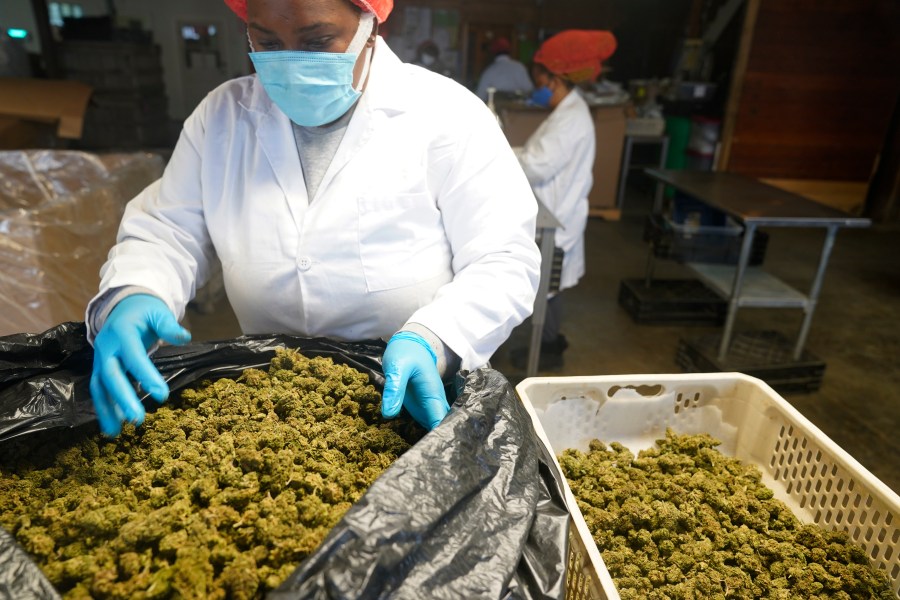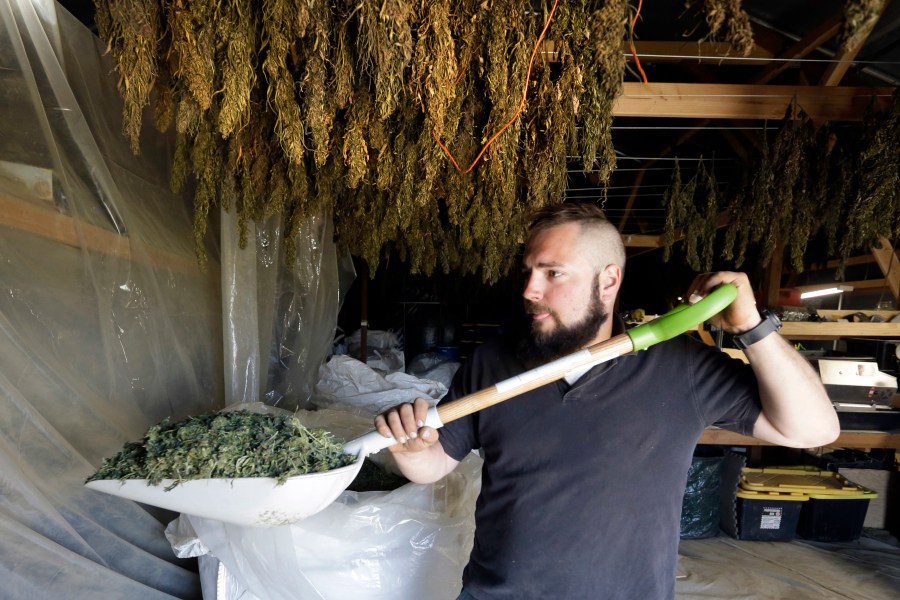PORTLAND, Ore. (KOIN) — A new consumable hemp compound has exploded into popularity in the last couple of years, marketed as a way to legally get “high.”
But Oregon lawmakers are now seeking to bring Delta-8 THC and other “artificial” cannabinoids under new scrutiny.
What is Delta-8 THC?
Delta-8 THC is often advertised as a hemp-derived alternative to typical THC products for consumers seeking a more clear-headed, manageable “high.”
While Delta-8 can produce some psychotropic effects in certain people, it is considered less potent than its cousin, Delta-9 THC, which is the primary form of THC people associate with most marijuana products, said Dr. Jane Ishmael, associate professor at Oregon State University’s College of Pharmacy.
“The easiest way to think of it is that Delta-8 is very similar structurally to Delta-9 THC.”
Dr. Jane Ishmael, Associate professor at oregon state university
Still, the way Delta-8 interacts with the brain is similar to Delta-9 THC, Ishmael said.
“The easiest way to think of it is that Delta-8 is very similar structurally to Delta-9 THC,” Ishmael told KOIN 6 News. “And it does bind directly to the CB(1) and CB(2) cannabinoid receptors … maybe with a lower affinity so it doesn’t bind quite as well as Delta-9 THC, but basically it’s a ligand for the same receptor.”
Is Delta-8 federally legal?
Unlike Delta-9 THC, nearly all Delta-8 products are synthetically taken from CBD, which comes from hemp. Some argue that this means Delta-8 can be sold legally across the country thanks to the 2018 Farm Bill, which legalized cannabinoids derived from hemp.

But the waters are still murky for Delta-8’s federal legal status. It’s considered a Schedule 1 Controlled Substance by the U.S. Drug Enforcement Administration since it can potentially cause “psychoactive impairment.” This means Delta-8 products require the same regulatory structure as marijuana, according to the Foundation of Cannabis Unified Standards.
Despite this, Delta-8 THC is available for purchase in Oregon outside the Oregon LCC adult-use market.
“When this was brought to my attention alarm bells went off in my head,” said Paul Rosenbaum, OLCC Commission Chair during a March OLCC meeting discussing potential Delta-8 regulations. “You have minors going into grocery stores and they understand very well what this is all about. And let me tell you, if there’s a way to find it, people will do it.”

In Oregon, Delta-8 THC doesn’t receive the same regulations as more conventional marijuana products. It’s not addressed in the Oregon statutes, and there is also no testing for Delta-8 THC or the by-products included in its chemical conversion.
This has raised concerns by those in the hemp industry and regulatory gatekeepers alike who say the compound needs more study beyond anecdotal testimonies.
There is also no definitive proof yet that a lot of the Delta-8 products on the market are as safe as advertised, said Eric Steenstra, president of Vote Hemp, a hemp farming advocacy group.
“Personally, I would not consume any of those products or recommend consuming, not based on legality, but just on the question of whether or not it’s safe,” Seenstra said. “There’s been a massive rush to market these products as natural, as safe, as legal.”
While Delta-8’s legal status remains inconclusive, some states, including Oregon, are taking regulatory matters into their own hands.
How does Oregon plan to address Delta-8?
An Oregon house bill introduced earlier this year targets Delta-8 THC and other “artificially derived” cannabis products by in part expanding the Oregon Department of Agriculture and Oregon Liquor Control Commission’s regulatory authority on cannabis and cannabinoids.
If signed into law, HB 3000 would allow the OLCC to set potency limits on artificially-derived cannabinoids, as well as clarify requirements for testing hemp cannabinoid consumable products.
The bipartisan bill would also establish a task force to explore how new consumable cannabis products should fit into Oregon’s legal cannabis market.
Some industry advocates are dubious about this proposed task force, arguing that it needs to include folks who are in the hemp industry.
“…(M)oving forward industry representatives need to be seated at the table for any task force or workgroups regarding hemp regulations,” wrote Jackson Haney, who cultivates hemp near Ashland in public testimony during the bill’s hearing.
While most in the hemp industry appear to support more research for Delta-8 THC, some worry that the stipulations under HB 3000 would only harm hemp farmers.
“Taking a federally legal substance like hemp and subjecting it to federally illegal marijuana regulations just simply doesn’t make sense, and, more importantly, places unnecessary and burdensome regulations on agricultural production- to the detriment of Oregon, and its citizens,”
Rick Trojan, Hemp Industries Association
Hemp advocate and president of Hemp Industries Association Rick Trojan argued in written public testimony that stipulations under HB 3000 would “destroy Oregon’s hemp industry overnight.”
“Taking a federally legal substance like hemp and subjecting it to federally illegal marijuana regulations just simply doesn’t make sense, and, more importantly, places unnecessary and burdensome regulations on agricultural production- to the detriment of Oregon, and it’s citizens,” he wrote.
Oregon cannabis attorney Leland Berger wrote in public testimony that he wasn’t necessarily opposed to the bill, but he was concerned about a stipulation in the bill that prohibits those convicted of a felony in the last 10 years from obtaining a hemp license.
“This is both out of sync with the 2-year limitation for cannabis prior convictions in the OLCC licensing application statutes, and will have a disproportionate impact on the BIPOC community as these folks were significantly more likely to be arrested and prosecuted during cannabis prohibition in our state,” he wrote.
